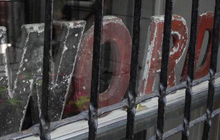Kurt Thometz is one of the most fascinating characters we have met on our journey. A Minnesota-born bookseller and writer, he moved to New York in the 1970s and went from working in bookstores to tending the private libraries of Brooke Astor and Diana Vreeland, Leonard Lauder, Diane von Fürstenberg, various Newhouses, and other essential rich and famous city figures.
Surrounded by more than 15, 000 pieces of literature, he now resides with his wife and son in a brownstone on Jumel Terrace in Washington Heights. Thometz rents out his former book store and the adjacent garden apartment, which is where we lived last month. As the Times put it, Thometz may know more about the city “than all of his books combined”.
Before we moved on from the neighborhood, we asked him to share his quintessential readings on the five boroughs.
Forsaking All Others, Jimmy Breslin
“The first New York book that comes to mind is by Jimmy Breslin. I got such a fucking kick out of it. It’s a Dominican-Italian story—Bronx, drug trade. A mafioso Dominican guy in jail upstate befriends an Italian guy whose family are major heroin dealers. When he gets out of jail, he goes to his inmate buddy’s father to get work, to get back in the game. And he drives right across the GW Bridge into Alpine, Fort Lee. He comes in and the mobster’s daughter is this pretty girl, a tough Jersey girl. She sees him and before you know it, they’re having an affair.
Breslin is of my time in the city from the early ’70s. He is a populist writer—he is The Daily News, the Post. He’s such a connoisseur of New York City, and not Manhattan necessarily. He does Bronx, Queens, Brooklyn, Staten Island, working class, cops and robbers—the vernacular of New York. The way the street talks. I don’t think anybody gets it better than Jimmy Breslin.”
The Bonfire of the Vanities, Tom Wolfe
“Really, in so many ways, The Bonfire of the Vanities, Tom Wolfe’s novel of that particular ’80s decade, when greed was king and we were at the beginning of the corporate raiders, who were buying up companies, chopping them off, selling off the pieces—that one nails it. I knew Tom when he was writing it. That is a very important New York City novel. And maybe the last important New York City novel.”
Just Kids, Patti Smith
“I’ve known Patti since the early ’70s. In fact, before I came to New York I met Patti and she said ‘You oughta live in New York, they’d like you.’ My first job in a bookstore was in Minneapolis. I had been working in the theater out of high school, which introduced me to the arts, because my people weren’t educated. I loved the theater, but I actually started to enjoy reading it as much as being in the theater scene. I was just smitten with the written.
So I got a job in a bookstore. I didn’t go to college because I could read anything, my job was just to be well read. Patti came in because her first book of poetry Seventh Heaven came out, and she came to sign copies of it. She told me I looked like James Dean and would I come to her poetry reading. So I showed up with my best friend, and we were drunk and we heckled her—and being a punk, she loved that.”

The Rosy Cruzifixion: Sexus, Nexus, Plexus, Henry Miller
“Henry Miller was my 16-to-20-year-old grasp of the city that I would live in for the rest of my life, and I was reading it from Minneapolis. I read Sexus, Nexus, and Plexus, his three autobiographical memoirs of New York, before he goes to Paris. When he meets June, the taxi hall dancer, and he is a delivery boy for Western Union.
It gave me the idea that New York City and Brooklyn were every bit as sexy as Paris. Miller made New York City sexy, that really got me. The romance of the boroughs. I came here and I lived in the youth ghetto—the East Village—very decadent, but wonderful. But you really become a New Yorker when you move away from the youth ghetto and go and live in the boroughs.”
Really The Blues, Mezz Mezzrow
“There is this book by a jazz musician about Harlem in the ’20s, and into the ’30s. It’s by a white guy who played with the Austin High Gang in Chicago. This guy, Mezz Mezzrow, wasn’t a very good clarinet player, but his autobiography is the first book in the jazz vernacular, the first book written in the jazzman slang.
Musicians always had their own language—you hear it in New Orleans, you hear it in Chicago—but nobody had really written it down. This book has a glossary of what these strange hipster terms mean. And Mezzrow was reputedly the first guy to sell marihuana in Harlem, so that a joint in the ’20s and ’30s was known as a ‘mezz’ or ‘mezzroll.’ If that isn’t a claim to fame.”
The Long Loneliness, Dorothy Day
“I don’t know any Staten Island book with the exception of the autobiography of Dorothy Day, who started the Catholic Workers Party. She is a Christian, a Catholic mystic almost, who becomes a social radical. It’s rural Staten Island, long before the Jersey Shore TV show. Don’t miss the Staten Island Mall. It’s quite a trip.”
Angel of the Odd, Edgar Allen Poe
“Who really sets the tone for New York? Walt Whitman, of course, is where you kind of start. Whitman and Edgar Allen Poe, two of the quintessential writers in the early part of the 19th century. The romantic concept of America was born through them. Poe’s “Angel of the Odd” is hilarious and wonderful.”
Poet in New York, Federico Garcia Lorca
“One more book that was of enormously critical importance to me that I read when I was young, before I moved here, and has remained a vademecum—which is what we call a book that you always have and always return to—is Federico Garcia Lorca’s Poet in New York, especially the ‘King of Harlem’ poem.”
Open City, Teju Cole
“Teju’s book is probably the best I have read in the last decade. I was so flattered for the longest time because I had met Teju and so many people came up to me and said, ‘You are in that book!’ And I said ‘no, I am not,’ and I had to read it, like, twice and I didn’t find myself. I wasn’t in it. I was amazed that all these people, even my neighbors, felt like I was a character in that book. I guess I could have fit into that book, but I brought it up to Teju and he said, ‘No, you are not.’
I am in endless admiration of Teju. I might be able to say he is my favorite contemporary writer. He is a travel writer at a time when there is nothing less romantic than traveling.”

A Brief History of Seven Killings, Marlon James
“When I hit page 616 of this book, there I was, fictionalized. It starts with my usual commute and it winds up with a guy like me who owns my house getting the shit kicked out of him and water-boarded in my bathtub by four guys like the author.
In the late 2000s our neighbor, Mr. James, became a part-time resident and family member of our house. He wrote some of his perfectly marvelous Book of Night Women and his Man Booker-winning A Brief History of Seven Killings on the premises on my dime, and this is the thanks I get.”
The World of Our Fathers, Irving Howe
“I was raised to be anti-Semitic. I really had to uneducate myself from racism. I had to un-edcuate myself from these prejudices. They don’t just go away—I really had to unlearn them. And Irving Howe’s book about the Jewish Lower East Side is wonderful. It will introduce you to everybody you need to know, everybody you want to know; it’s a great story.
There is black New York, there is Puerto Rican New York, there is Dominican New York, there is rich people New York, there is beatnik New York, there is punk New York, there is all these New Yorks, but the Jewish New York is very special.”
Short Eyes, Miguel Piñero
“There is a riveting, fascinating, rewarding body of Nuyorican poetry and novels and dramas, with Miguel Piñero being my favorite. They even made a movie out of his play called Short Eyes, which has a wonderful soundtrack by Curtis Mayfield. These scenes of mostly poets, really good poets, really street, really cool, is alive today in the East Village at the Nuyorican Poets Cafe.”
The Mambo King Sings Songs of Love, Oscar Hijuelos
“It’s Cuban New York at the time of the Palladium in the ’50s, when Machito and Chano Pozo and Mongo Santamaría and these incredible people made everybody dance the mambo. Charlie Parker played it, inspired by these musicians, and there is a whole body of Jewish mambo, which is quite something. Latin music was popular in New York long before Jazz. Hijuelos wrote half a dozen novels, mostly about Cuban New York. It’s charming, and so good, you can almost feel the music.”
“Only The Dead Know Brooklyn,” Thomas Wolfe
“Because Brooklyn is so big and so diverse that it takes more than a lifetime to know it. What a great title.”
Another Country, James Baldwin
“Let me reel back to where I started reading New York in suburban Minneapolis. I was a chain-smoking, longhaired, druggy, pimple-faced teen, reading James Baldwin’s Harlem novels before I had any experience of what he was talking about. In the ’60s all I knew about the souls of black folks was what I saw on tv and heard on AM radio. When I read Baldwin I was too young and inexperienced to get it —Just Above My Head—was just above my head. But I got enough of it to head off to Another Country. And here I am. James Baldwin saved me.”
Now, we would like to hear about your favorite New York books. What is your Vademecum, your city read that you always return to? Let us know in the comments, or via Twitter and Instagram. We would love to feature some of your picks in our upcoming newsletter, which you can subscribe to here.
Interview has been condensed and lightly edited for clarity.
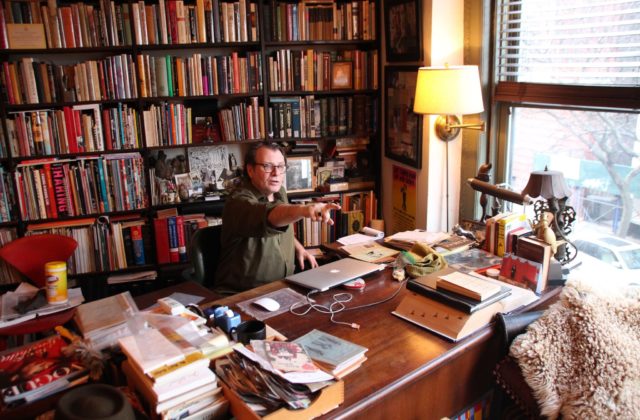
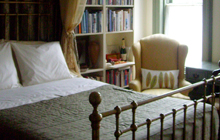 Jumel Terrace B&B
Jumel Terrace B&B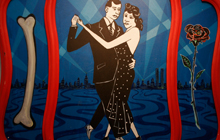 Life Turns Man Up & Down
Life Turns Man Up & Down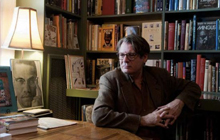 The Private Library
The Private Library